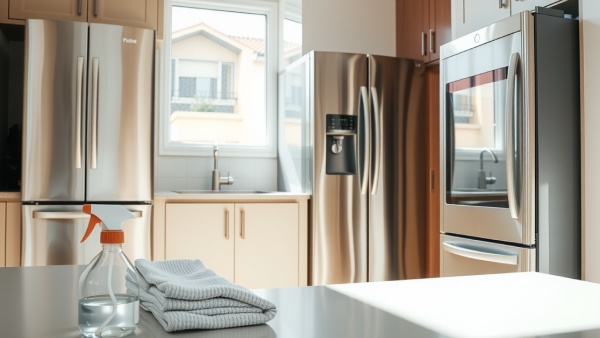Chances are, if you have been to a contemporary kitchen, you noticed the shininess of stainless steel. Modern and reflective, professional in look, no wonder many homeowners and designers prefer stainless steel appliances. Still, all of this is beauty at a price: fingerprints, smudges, and water marks that show up all too easily.
Providing cleaning services in Tampa, our company has seen it all: from spotless kitchens to sticky fridge doors and ovens with mystery stains. In this article, I want to share not just generic tips, but what actually works in real life. Years in the cleaning business have taught me: keeping stainless steel in great shape isn’t about expensive chemicals—it’s about knowing how to handle it and what to avoid.

What Makes Stainless Steel Tricky to Clean?
The name might suggest it’s “stainless,” but stainless steel is surprisingly vulnerable to fingerprints, smears, hard water stains, and even scratches if cleaned the wrong way. That’s because the surface is coated with a protective chromium layer that gives it that distinctive sheen – and that layer is more delicate than most people realize.
Common Enemies of Stainless Steel
- Abrasive sponges or scouring pads
- Chlorine bleach or harsh chemicals
- Tap water with high mineral content
- Wiping against the grain
Request an Estimate Today
Make your home spotlessly clean with Wow Now Cleaning
Tools and Products You Actually Need
The name might suggest it’s “stainless,” but stainless steel is surprisingly vulnerable to fingerprints, smears, hard water stains, and even scratches if cleaned the wrong way. That’s because the surface is coated with a protective chromium layer that gives it that distinctive sheen – and that layer is more delicate than most people realize.
Common Enemies of Stainless Steel
- Abrasive sponges or scouring pads
- Chlorine bleach or harsh chemicals
- Tap water with high mineral content
- Wiping against the grain
Tools and Products You Actually Need
- Microfiber cloths
- Distilled white vinegar
- Mild dish soap
- Olive oil or baby oil
- Spray bottle with distilled water
Step-by-Step Guide to Cleaning Stainless Steel Appliances
Step 1: Wipe Down with a Damp Microfiber Cloth
Remove loose dirt, crumbs, or dust with a microfiber cloth dampened with warm distilled water. Always wipe in the direction of the grain – you’ll see the subtle lines running horizontally or vertically.
Step 2: Use Vinegar for Smudges and Spots
Spray white vinegar directly onto the surface and let it sit for about 30 seconds. Then wipe off with a clean microfiber cloth. This dissolves oils and lifts away those stubborn fingerprints.
Step 3: Tackle Grease with Mild Soap
Use warm water to which a few drops of dishwashing liquid have been added to clean grease buildup around handles or on cooktops. Dip a soft cloth in the solution, wring it out very well, and gently wipe in the direction of the grain. Rinse with distilled water and pat dry. Wipe a dry microfiber cloth across the surface in order to make it appear dust-free (avoid dripping liquids directly onto the appliance; always apply liquid to the cloth). This will bring out its natural sheen with a slight protective finish for easier future cleaning.
Step 4: Regularly
Lastly, whether or not your appliance appears clean, it is advisable to dry polish it at least once or twice every week.
What to Avoid – and Why It Matters
- Steel wool or abrasive pads
- Products with chlorine bleach
- Ammonia-based glass cleaners
- Hard water for rinsing
- Paper towels (they can leave lint and fine scratches)
Treat stainless steel gently, and it’ll reward you with that same sleek, modern look for years.
Real Talk: Is It Worth the Effort?
Absolutely – but only if you commit to doing it right. The key isn’t in cleaning more, it’s in cleaning smart. Stainless steel is a material that responds beautifully to the right kind of attention. If you develop a weekly routine using the method above, you’ll notice how much easier it becomes to maintain.
Final Thoughts
If you’re investing in a beautiful kitchen, it only makes sense to take good care of it. Stainless steel might seem high-maintenance at first, but once you understand what it needs, it becomes a breeze
The tools are simple, the routine is manageable, and the results speak for themselves. A streak-free fridge door or a spotless oven doesn’t just look better – it makes your whole kitchen feel more inviting.
And if you’d rather leave it to the pros? Well, you know where to find us: house cleaning Tampa
FAQ
OTHER ARTICLES

Hi, I’m Tetiana, your go-to cleaning expert! I share tips and articles to keep your home sparkling. I’d love to hear your feedback and comments!

6 Comments
I never would’ve thought that even paper towels can scratch stainless steel… Thanks for the tip!
You’re very welcome – it surprises a lot of people! Paper towels may seem soft, but they can leave micro-scratches over time, especially with frequent use. Microfiber really is a game-changer when it comes to protecting delicate finishes like stainless steel.
I tried polishing my oven with baby oil – the result was amazing! Thanks so much for the tip!
That’s wonderful to hear – we’re so glad it worked for you! A little baby oil goes a long way in bringing out that shine and creating a subtle protective layer. Keep it up, and your oven will stay looking brand new!
I accidentally wiped the stove with a rough sponge and now there are scratches. Is there any way to fix it?
It happens – don’t worry! For light surface scratches, you can try making a gentle paste of baking soda and water, then buffing it into the surface with a soft microfiber cloth, always following the grain. There are also stainless steel polishing products that may help reduce the appearance. Just be careful not to use anything too abrasive moving forward.